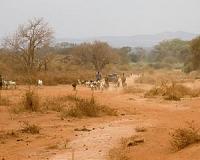 |
Boulder CO (SPX) Nov 03, 2010 If you're a vegetable gardener in a lot of older cities, there's a fair chance you have a significant amount of lead in your soil. One common mitigation approach is to build a raised bed and fill it with freshly composted, low-lead soil from elsewhere, right? Maybe not, according to researchers studying the mysterious case of the lead contamination found within raised beds in community gardens in the Boston communities of Roxbury and Dorchester. "Raised beds are surrounded by a sea of contaminated soil," said Daniel Brabander of Wellesley College. Brabander, his students and colleagues have been studying the lead in 144 backyard gardens in coordination with The Food Project, an organization committed to food security, nutrition and sustainable urban agriculture. Eighty-one percent of the gardens they studied were found to have lead levels above the U.S. EPA limits of 400 micrograms of lead per gram ( g/g) of soil. To solve that problem, raised wooden beds with freshly composted soil were installed in backyard and community gardens by the Food Project. But the researchers have found that the soil in raised beds that starts with as little as 110 micrograms of lead per gram of soil rose to an average of 336 g/g of lead in just four years. "We're trying to get a better handle on the mode of transport and the source," said Estes. That means some pretty detailed monitoring and chemical analyses of the minerals in the soils as well as the kind of lead that's in the soil. Lead contamination in most cities comes from primarily two sources: leaded gasoline and lead paint. Although both sources have been banned, plenty of that lead remains in urban soils all around the raised bed gardens. Roxbury and Dorchester soils have a lot of lead, but they are not unique. "It's more elevated than similar neighborhoods, but not unlike other cities," said Estes. "On the East Coast, where cities are a bit older, it's more of a problem," said Brabander. And even within a city the lead contamination can vary significantly, he said, depending on historical traffic patterns and even such very local effects like a house containing lead paint burning down on a lot that is later used for gardening. The main suspects in transporting lead into raised beds are wind and perhaps rain, which splatters the ground and can potentially throw fine particles of contaminated soil into the raised beds. The good news in Roxbury and Dorchester is that the kinds of lead being found are not particularly good at being absorbed by the human body, said Estes. There's also a relatively simple and inexpensive way to keep the lead out of raised beds: just scoop away the top inch or two of soil every year from a raised bed and properly dispose of it, according to local regulations. This research is funded by a Brachman-Hoffman Fellowship that supports new scientific research directions among faculty at Wellesley College.
Share This Article With Planet Earth
Related Links Geological Society of America Farming Today - Suppliers and Technology
 Broadening Market Opportunities For Africian Livestock Farmers
Broadening Market Opportunities For Africian Livestock FarmersAddis Ababa, Ethiopia (SPX) Nov 02, 2010 As agricultural leaders across the globe look for ways to increase investments in agriculture to boost world food production, experts in African livestock farming are meeting in Addis Ababa this week to deliberate on ways to get commercialized farm production, access to markets, innovations, gender issues and pro-poor policies right for Africa's millions of small-scale livestock farmers and herd ... read more |
|
| The content herein, unless otherwise known to be public domain, are Copyright 1995-2010 - SpaceDaily. AFP and UPI Wire Stories are copyright Agence France-Presse and United Press International. ESA Portal Reports are copyright European Space Agency. All NASA sourced material is public domain. Additional copyrights may apply in whole or part to other bona fide parties. Advertising does not imply endorsement,agreement or approval of any opinions, statements or information provided by SpaceDaily on any Web page published or hosted by SpaceDaily. Privacy Statement |